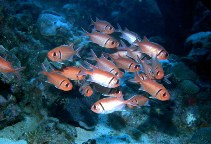| Family: |
Holocentridae (Squirrelfishes, soldierfishes), subfamily: Myripristinae |
| Max. size: |
25 cm TL (male/unsexed) |
| Environment: |
reef-associated; marine; depth range 0 - 210 m |
| Distribution: |
Western Atlantic: North Carolina (USA), Bahamas and northern Gulf of Mexico to Brazil; throughout the West Indies and the Caribbean Sea (Ref. 3724). Eastern Atlantic: St. Paul's Rocks (Ref. 13121), Cape Verde, Principe, Ascension and St. Helena islands (Ref. 6537). |
| Diagnosis: |
Dorsal spines (total): 11-11; Dorsal soft rays (total): 14-14; Anal spines: 4-4; Anal soft rays: 13-14. Soft dorsal and anal fins covered with scales (Ref. 13608). Dark brown vertical bar runs along gill opening to pectoral fin (Ref. 26938). Body deep, compressed and robust (Ref. 37108). Body reddish above, paling to silvery below. Spinous dorsal fin with red and white markings. Edges of all fins are white. Preopercular spine not prominent. Lobes of caudal, soft dorsal and anal fins pointed (Ref. 7251). |
| Biology: |
Found from shallow coral reefs to offshore deeper waters (Ref. 3724). A nocturnal species aggregating around coral reefs and deeper rocky reefs (Ref. 3724). Feeds mainly on planktonic organisms (Ref. 3724). Occasionally found swimming upside down (Ref. 9710). Marketed fresh but not popular as a food fish (Ref. 5217). |
| IUCN Red List Status: |
Least Concern (LC); Date assessed: 29 January 2013 Ref. (130435)
|
| Threat to humans: |
harmless |
Source and more info: www.fishbase.org. For personal, classroom, and other internal use only. Not for publication.
